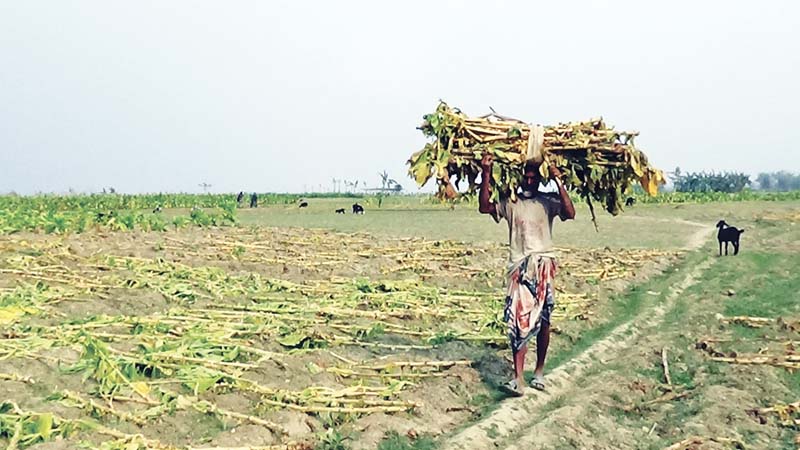Tobacco Farming Eating up Rabi Cropland
Its farming increases alarmingly in Rajbari for profit


Reducing the cultivation of Rabi crops, a good number of farmers in Rajbari are joining the growing number of tobacco cultivators, being lured by high profits.
As a result, the cultivation of rabi crops like wheat and rice is decreasing in the district while tobacco farming is having rapid growth.
Meanwhile, the allegation of child labor being used in tobacco harvesting and drying has been raised by a different section of society.
Concerned doctors said children might be attacked by complex diseases like cancer and asthma through working in tobacco farms.
Amid concerns expressed by different strata of society, a growing number of farmers are being involved in tobacco farming in the district, under the direct patronage of British-American Tobacco.
Read More: Tobacco companies use ill tactics to lure teenagers
Tobacco widely used in different types of cigarettes is a harmful product for the human body. There are plenty of nicotine in it which enters into the human body through the smoke inhaled, causing great damage to the lungs and heart and inviting lungs, liver and heart-related diseases and various types of cancer.
Farmer Panna of Bararichar Beninagar Kalitla village of Mizanpur union said, “What will you do without tobacco? Nobody watches us. I do not get good prices for cultivating vegetables. We face problems cultivating wheat as farm laborers are not available during the wheat harvest.”
“But the cultivation of tobacco has no such problem as women and children can be used to pluck tobacco leaves during the harvest,” he added.
In reply to a query, he said, “Representatives of British-American Tobacco supply us with seeds and fertilizers. They also buy the production at Tk 100 per kg after the harvest, providing more than double profit comparing to wheat.
“That is why we are cultivating tobacco,” he concluded.
Khorshed Sardar of Dhawapara village at Chandani union said that he cultivates wheat on two bighas of land every year to meet the home demand. He cultivates tobacco on the rest of his lands.
Asked about the reasons for not producing wheat for additional income, he said, "Lack of good seed and unfavorable weather are the main reasons. Moreover, tobacco cultivation ensures high profit also.” Saiful Islam, another tobacco farmer from the same village said, “As the company people provide everything starting from seed to fertilizer, along with guaranteeing to buy produced crop with higher prices, there is no risk. I'm planting tobacco for that reason.”
Mohammad Azad Sheikh, a farmer from Khanganj Union said, "The government does not provide loans to the farmers without official papers. But to cultivate tobacco, farmers don’t need a single penny for themselves. Money, fertilizers, seeds, medicine, everything is provided by the company, we just put our labor only.
“That’s why, this year, I have cultivated tobacco on two acres of land instead of cultivating wheat,” he added.
The tobacco is being cultivated in different unions of Rajbari Sadar, Baliakandi, Kalukhali, Goalanda, and Pangsha Upazilas.
Ignoring the harmful aspects of tobacco cultivation farmers of the district are greedily cultivating tobacco in the hope of getting more and more profit, observed agriculture officials in the district.
Read More: Strict steps to control tobacco stressed
They said, on the one hand, tobacco's harmful nicotine substances harm the human body and body while plucking and drying tobacco, and on the other hand, fertility of the soil also gets reduced year by year.
Locals said the air of the locality is being polluted during tobacco drying as farmers usually dry the plucked tobacco leaves hanging in their homes, yards, and beside the streets, emitting a heavy smell of tobacco, causing breathing problems to people. Tobacco farmers are now drying tobacco in all kinds of trees, gardens, and houses.
They urged the government to take immediate steps to stop such malpractice.
District DAE Deputy Director Mohammad Fazlur Rahman said this year, tobacco is being cultivated on 31 hectares of land in Rajbari. Observing that no step can be taken to stop tobacco cultivation due to lack of law, he said, “But the farmers can be discouraged from cultivating the harmful crop by highlighting the bad results.” Rajbari Deputy Commissioner Mohammad Shawkat Ali said in the development coordination meeting of the district, the DAE officials have been instructed to take steps to reduce and discourage tobacco cultivation.



